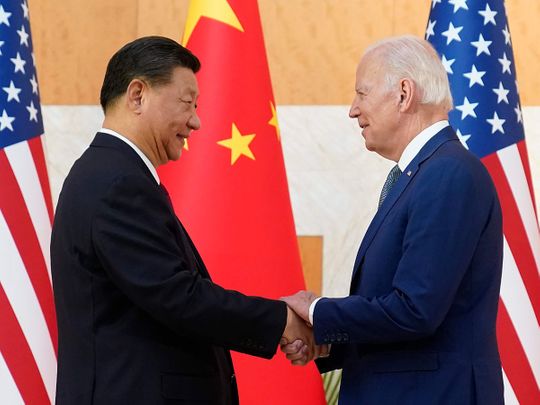
Nusa Dua, Indonesia: President Joeo Biden and Chinese President Xi Jinping held a three-hour, high-stakes meeting here Monday, with Biden saying that "I absolutely believe there need not be a new Cold War" after their first in-person exchange as their nations' leaders at a time of brewing tensions between the global powers.
The encounter was Biden's most consequential during a week-long foreign trip, as the two countries have collided on trade, the war in Ukraine, and economic and military threats amid fears that the U.S.-China relationship could devolve into a Cold War of sorts.
"I'm convinced that he understood exactly what I was saying, and I understood what he was saying," Biden told reporters after the meeting. "I've met many times with Xi Jinping, and we were candid and clear with one another across the board."
He said he did not believe that a Chinese attack on Taiwan was imminent. He stressed that the United States and China would compete vigorously but were not looking for conflict. And while Xi has recently consolidated power in China, Biden said that "I didn't find him more confrontational or conciliatory, I found him the way he's always been - direct and straightforward."
Soothing tensions
Casting the meeting as one that could begin to soothe tensions, he also said he had asked Secretary of State Antony Blinken to travel to Beijing to follow up on Monday's discussion.
Biden's overall message was that the meeting had lowered the temperature between the countries. But the president was also careful to stress that there had been no "Kumbaya" moment.
With aides and advisers looking on from long, draped tables in a ballroom at the palatial Mulia Resort - everyone in the delegations wearing masks except for the two principal figures - both presidents stressed in their opening remarks the importance of face-to-face diplomacy and expressed hope that they could get the U.S.-China relationship back on track.
"The world expects, I believe, the U.S. and China to play a key role in global challenges, from climate change to food insecurity, and for us to be able to work together," Biden said in his opening remarks. "The United States stands ready to do just that."
Bilateral relationship
Xi said a few moments later that "China-U.S. relations currently face a situation that is not in the interests of the two countries, their peoples or the expectations of the international community. As the leaders of China and the United States, we must take the helm and steer the bilateral relationship in the right direction."
It was a notable change in tone from some of Biden's comments during his presidential campaign.
As reporters were being ushered out of the room, a TV producer called out to ask Biden if he would raise human rights during the talks. A man on the Chinese side yanked the producer backward by her backpack, and she lost her balance but didn't fall. Two White House staff members then intervened and said the producer should be left alone.
Each leader, in Bali for the Group of 20 summit, came to the table feeling newly emboldened. Xi has consolidated control — securing a third, norm-defying five-year term and concentrating power to a degree not seen since the days of Mao Zedong and Deng Xiaoping. Biden is fresh off a midterm election in which his party did far better than expected and will maintain its Senate majority.
Beijing's version of the meeting had a different tone from the White House summary, as each side stressed the firmness of its own leader's positions. In the Chinese account, Xi had strong words for Biden on Taiwan, describing it as the "number one inviolable red line of China-U.S. relations," while accusing the United States of "politicising and weaponising" economic, trade and technological exchanges.
China also said Xi rejected Biden's narrative of a global competition between democracy and autocracy. "The United States has American-style democracy, and China has Chinese-style democracy," Xi purportedly said, and those differences should be "recognized and respected."
White House officials have been jubilant since last week's Democratic showing in the midterm elections, saying foreign leaders have approached Biden to comment on his fresh domestic victories. "I think the election held in the United States ... has sent a very strong message around the world that the United States is ready to play," Biden said during his news conference.
"The Republicans who survived, along with the Democrats, are of the view that we're going to stay fully engaged in the world and that we, in fact, know what we're about," he added.
The sit-down between Biden and Xi occurred on the third day of Biden's swing through Asia. He first arrived in Phnom Penh, Cambodia, on Saturday for a summit with leaders of Southeast Asian nations, where the U.S. aim was to unite them as a counterweight to the rising economic and military threat China poses.
The face-to-face was a result of months of quiet negotiations. Senior Biden administration officials cast those discussions as an improvement in the countries' interactions even as they kept expectations low for any breakthrough because of the meeting.
Start of a long process
Biden and Xi have held five phone calls since the start of Biden's presidency, but they had not met in person since 2017.
White House officials characterised the moment as the start of a long process, one to help thaw a relationship rife with so much tension that even talks on issues of mutual interest, such as climate change, have sometimes been shut down. Officials said they know that the United States is in "stiff competition" with China — and Biden "embraces that" — but that ongoing dialogue is important to defuse conflicts.
"Lines of communications should be open. Period, full stop," said a senior administration official ahead of the meeting. "The only thing worse than having contentious conversation is having no conversation at all."
Biden has maintained tariffs on China that were imposed by President Donald Trump, and he has implemented restrictions on selling semiconductors and chip-making equipment to China.
"He wants to make sure that competition is bounded, that we develop guardrails, that we have clear rules of the road and that we do all of that to ensure that competition does not veer into conflict," said the administration official, speaking on the condition of anonymity to preview the talks.
Rapid growth
After decades of rapid growth, the Chinese economy has markedly slowed this year, in part because of repeated lockdowns under Xi's "zero covid" policy. The International Monetary Fund said last month that the country's annual growth rate is expected this year to be 3.2 percent, compared with more than 8 percent in 2021.
"First and foremost, the meeting today is intended to stabilize the relationship between the United States and China and to create a more certain atmosphere for U.S. businesses so they understand what to expect," Yellen said.
The treasury secretary reiterated that U.S. companies are overly dependent on China as a source for critical products, including minerals needed to produce electric-vehicle batteries. But she suggested that much of the $600 billion in annual trade flows between the countries should continue.
"We want a more secure and more resilient supply chain. But certainly over a wide range of commercial activities - and U.S. firms doing business in China - that's certainly not something that we are intending to hamper," she said.
The White House said after the meeting that Biden had brought up China's human rights violations in Hong Kong, Tibet and Xinjiang. But officials sought to balance those volatile topics with an emphasis on the potential for cooperation between the superpowers.
"Both sides seem to want the leaders meeting in Bali to lower the temperature in an overheated relationship," said Danny Russel, a former diplomat who advised Biden on past meetings with Xi and who is now vice president of the Asia Society Policy Institute.
"Washington is mindful of the risk of an unintended incident quickly escalating into a crisis," Russel added. "Beijing seeks to avoid another round of punishing US measures like the recent export controls on semiconductors."
Going into the meeting, China had signaled it wanted to put ties back on track and keep disagreements from spiraling into conflict. But the two sides have totally different ideas about how to establish guardrails, noted Chen Dongxiao, president of the Shanghai Institutes for International Studies, a think tank.
"China defines the 'floor' from a strategic and political perspective, which is fundamentally about not letting the United States repeatedly threaten or harm China's core interests," he said, while Beijing sees practical measures alone as "unreliable and of little use."
The White House has found it notable that Xi warned for the first time against the use of nuclear weapons in Russia's war on Ukraine when he sat down this month with German Chancellor Olaf Scholz. His comment was viewed as a clear signal to Russian President Vladimir Putin.
The meeting was held at the Mulia Resort, where both the Chinese and Russian delegations are reportedly staying. In the hours leading up to the high-profile meeting, groups of Russian and Chinese delegates milled around the grand lobby of the Mulia, which opens to a majestic view of palm trees lining the sea.
Foreign Minister Sergei Lavrov was not present when Biden and Xi arrived in their motorcades. The Biden-Xi meeting is a reconnection of sorts for a relationship that developed more than a decade ago, when each man was vice president of his country and tasked with getting to know each other and foster greater understanding.










